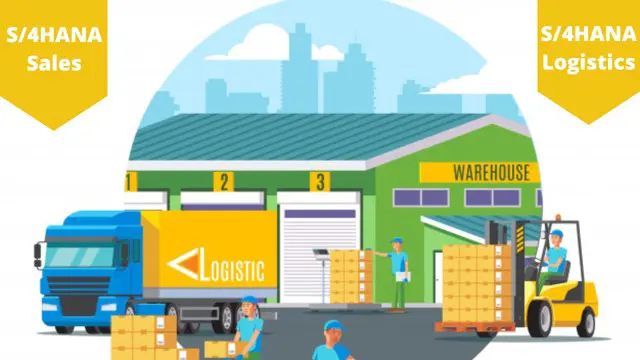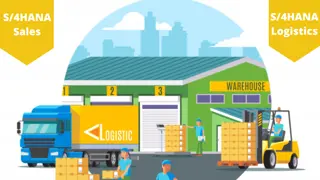
Bundle Combo - SAP S/4HANA Sales and S/4HANA Logistics
Self-paced videos, Lifetime access, Study material, Certification prep, Technical support, Course Completion Certificate
Uplatz
Summary
- Reed Courses Certificate of Completion - Free
- Uplatz Certificate of Completion - Free
Add to basket or enquire
Overview
Uplatz offers this comprehensive bundle course on SAP S/4HANA Sales and SAP S/4HANA Logistics modules consisting of a combo of video courses on all topics that are associated with SAP S/4HANA Sales and Distribution and SAP S/4HANA Logistics. You will be awarded Course Completion Certificate at the end of the course.
The SAP S/4HANA Sales module is a robust solution that helps businesses streamline and optimize their sales processes. It offers a range of features and functionalities to support effective sales management and customer engagement.
The SAP S/4HANA Sales module aims to enhance sales effectiveness, improve customer engagement, and drive revenue growth by streamlining sales processes, enabling better decision-making, and providing a holistic view of sales operations.
The SAP S/4HANA Logistics module is a comprehensive solution that helps businesses manage and optimize their logistics and supply chain operations. It offers a range of features and functionalities to streamline procurement, inventory management, production planning, and logistics execution
The SAP S/4HANA Logistics module aims to optimize supply chain operations, enhance efficiency, reduce costs, and improve customer satisfaction. It provides a centralized platform for managing and controlling logistics processes, enabling businesses to make informed decisions and respond quickly to changing market demands.
Curriculum
Course media
Description
Here are some key features of the SAP S/4HANA Sales module.
Sales Order Management: It enables businesses to create, process, and track sales orders efficiently. Users can manage order entry, order confirmation, availability checks, pricing, and credit management.
Pricing and Discounts: The module allows businesses to define and manage complex pricing structures, discounts, promotions, and pricing conditions. It supports various pricing strategies and automates price calculations based on predefined rules.
Customer Relationship Management (CRM): SAP S/4HANA Sales integrates with CRM functionalities to provide comprehensive customer relationship management capabilities. It helps manage customer data, track interactions, analyze behavior, and improve sales and customer service.
Inventory Management: Real-time visibility into inventory levels is provided, facilitating optimization of stock levels, tracking of goods movements, and management of replenishment and fulfillment processes.
Sales Analytics: The module offers powerful analytics and reporting capabilities, providing insights into sales performance, customer behavior, and market trends. It includes pre-built dashboards, reports, and ad-hoc reporting options for data-driven decision-making.
Mobile Sales: It supports mobile sales capabilities, allowing sales representatives to access relevant sales information, process orders, and interact with customers while on the go. This feature improves productivity and responsiveness.
Integration and Extensibility: SAP S/4HANA Sales integrates seamlessly with other modules within the SAP S/4HANA suite, such as finance, logistics, and production. This enables end-to-end business process integration. Additionally, it offers extensibility options for customization and adaptation to specific business requirements.
Here are some key features of the SAP S/4HANA Logistics module.
Procurement Management: It enables businesses to manage the procurement process efficiently. Users can handle supplier management, purchase requisitions, purchase orders, request for quotations (RFQs), and invoice verification. Supplier evaluation and strategic sourcing capabilities are also provided.
Inventory Management: The module provides real-time visibility into inventory levels, enabling businesses to optimize stock levels, track goods movements, and manage inventory across multiple locations. It includes features such as goods receipt, goods issue, stock transfers, physical inventory, and batch management.
Material Requirements Planning (MRP): SAP S/4HANA Logistics incorporates MRP capabilities to help businesses plan and manage their material requirements. It analyzes demand, inventory levels, and lead times to generate procurement proposals and ensure optimal stock availability while minimizing excess inventory.
Warehouse Management: The solution supports warehouse management processes, including inbound and outbound logistics, storage bin management, picking, packing, and shipping. It provides tools for optimizing warehouse layouts, managing storage bins, and tracking goods movements.
Production Planning: The module includes production planning features to help businesses effectively manage their manufacturing processes. It supports capacity planning, bill of materials (BOM), work center management, production orders, and shop floor control. This enables businesses to schedule and monitor production activities, optimize resources, and ensure timely delivery.
Transportation Management: SAP S/4HANA Logistics offers transportation management capabilities, allowing businesses to plan, execute, and monitor transportation activities. It supports freight order management, carrier selection, route optimization, shipment tracking, and freight cost calculation.
Analytics and Reporting: The module provides powerful analytics and reporting capabilities, enabling businesses to gain insights into their logistics operations. It includes pre-built dashboards and reports, as well as ad-hoc reporting options for data-driven decision-making.
Integration and Extensibility: SAP S/4HANA Logistics integrates seamlessly with other modules within the SAP S/4HANA suite, such as sales, finance, and manufacturing. This ensures end-to-end visibility and process integration. Additionally, it offers extensibility options for customization and adaptation to specific business requirements.
Who is this course for?
Everyone
Requirements
Passion to learn and succeed!
Career path
- SAP Sales Consultant
- SAP SD Consultant
- SAP Logistics Consultant
- SAP S/4HANA Consultant
- Sales Manager
- Logistics Manager
- Transport Consultant
Questions and answers
Currently there are no Q&As for this course. Be the first to ask a question.
Certificates
Reed Courses Certificate of Completion
Digital certificate - Included
Will be downloadable when all lectures have been completed.
Uplatz Certificate of Completion
Digital certificate - Included
Course Completion Certificate by Uplatz
Reviews
Currently there are no reviews for this course. Be the first to leave a review.
Legal information
This course is advertised on reed.co.uk by the Course Provider, whose terms and conditions apply. Purchases are made directly from the Course Provider, and as such, content and materials are supplied by the Course Provider directly. Reed is acting as agent and not reseller in relation to this course. Reed's only responsibility is to facilitate your payment for the course. It is your responsibility to review and agree to the Course Provider's terms and conditions and satisfy yourself as to the suitability of the course you intend to purchase. Reed will not have any responsibility for the content of the course and/or associated materials.


